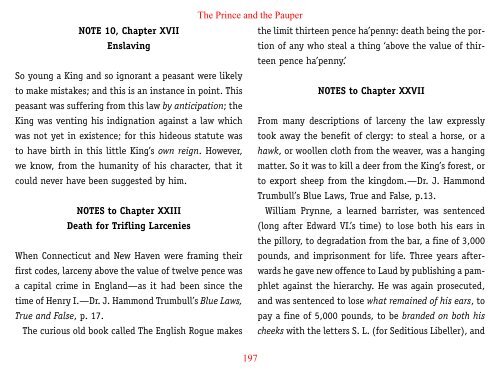The Prince and the Pauper - Penn State University
The Prince and the Pauper - Penn State University
The Prince and the Pauper - Penn State University
Create successful ePaper yourself
Turn your PDF publications into a flip-book with our unique Google optimized e-Paper software.
NOTE 10, Chapter XVII<br />
Enslaving<br />
So young a King <strong>and</strong> so ignorant a peasant were likely<br />
to make mistakes; <strong>and</strong> this is an instance in point. This<br />
peasant was suffering from this law by anticipation; <strong>the</strong><br />
King was venting his indignation against a law which<br />
was not yet in existence; for this hideous statute was<br />
to have birth in this little King’s own reign. However,<br />
we know, from <strong>the</strong> humanity of his character, that it<br />
could never have been suggested by him.<br />
NOTES to Chapter XXIII<br />
Death for Trifling Larcenies<br />
When Connecticut <strong>and</strong> New Haven were framing <strong>the</strong>ir<br />
first codes, larceny above <strong>the</strong> value of twelve pence was<br />
a capital crime in Engl<strong>and</strong>—as it had been since <strong>the</strong><br />
time of Henry I.—Dr. J. Hammond Trumbull’s Blue Laws,<br />
True <strong>and</strong> False, p. 17.<br />
<strong>The</strong> curious old book called <strong>The</strong> English Rogue makes<br />
<strong>The</strong> <strong>Prince</strong> <strong>and</strong> <strong>the</strong> <strong>Pauper</strong><br />
197<br />
<strong>the</strong> limit thirteen pence ha’penny: death being <strong>the</strong> portion<br />
of any who steal a thing ‘above <strong>the</strong> value of thirteen<br />
pence ha’penny.’<br />
NOTES to Chapter XXVII<br />
From many descriptions of larceny <strong>the</strong> law expressly<br />
took away <strong>the</strong> benefit of clergy: to steal a horse, or a<br />
hawk, or woollen cloth from <strong>the</strong> weaver, was a hanging<br />
matter. So it was to kill a deer from <strong>the</strong> King’s forest, or<br />
to export sheep from <strong>the</strong> kingdom.—Dr. J. Hammond<br />
Trumbull’s Blue Laws, True <strong>and</strong> False, p.13.<br />
William Prynne, a learned barrister, was sentenced<br />
(long after Edward VI.’s time) to lose both his ears in<br />
<strong>the</strong> pillory, to degradation from <strong>the</strong> bar, a fine of 3,000<br />
pounds, <strong>and</strong> imprisonment for life. Three years afterwards<br />
he gave new offence to Laud by publishing a pamphlet<br />
against <strong>the</strong> hierarchy. He was again prosecuted,<br />
<strong>and</strong> was sentenced to lose what remained of his ears, to<br />
pay a fine of 5,000 pounds, to be br<strong>and</strong>ed on both his<br />
cheeks with <strong>the</strong> letters S. L. (for Seditious Libeller), <strong>and</strong>

















